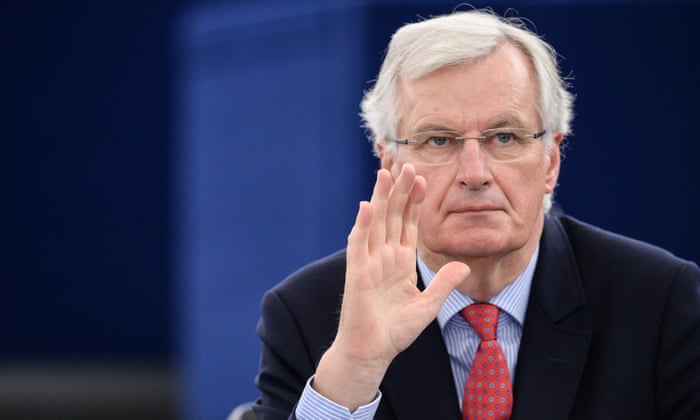European parliament backs red lines resolution for Brexit negotiations
Resolution on negotiating mandate insists that transition arrangement for UK after 2019 can last no longer than three years

Michel Barnier says parallel divorce and trade talks would be ‘very risky’. Photograph: AFP/Getty Images
 Daniel Boffey in Strasbourg-Wednesday 5 April 2017
Daniel Boffey in Strasbourg-Wednesday 5 April 2017
The European parliament has overwhelmingly backed a resolution detailing its red lines for Brexit negotiations.
MEPs in Strasbourg approved the negotiating mandate by 516 votes to 133, with 50 abstentions, comfortably exceeding the two-thirds majority sought by parliament leaders to show unity behind their approach.
The resolution calls for phased negotiations in the divorce proceedings, going against the wishes of London, which would like exit talks and discussions of a future trade arrangement to happen in parallel. It also asserts that the UK must respect its membership obligations until it leaves the EU.
Speaking during the debate that preceded the vote, the EU’s chief negotiator picked apart Theresa May’s argument for a swift Brexit deal, warning that parallel divorce and trade talks would be “very risky”.
Michel Barnier said it was not a ruse on the part of the EU to insist on dealing with the UK’s divorce bill first, but an essential precondition for success.
Citing the British prime minister’s six-page letter notifying the EU of the country’s intention to withdraw, he said: “Theresa May’s letter seeks a rapid agreement but, honourable members, the devil is quite clearly going to be in the detail and the six months of work done so far points to that.
“A single financial settlement, as a result of UK commitments to the EU, and the EU commitments to the UK, there your resolution is very clear. We do not seek to punish the UK but simply ask the UK to deliver on its commitments and undertakings as a member of the EU.”
Barnier said the European parliament’s resolution, as the first response to May’s letter by an EU institution, would set the tone for the talks.
The resolution insists that a transition arrangement for the UK after 2019 can last no longer than three years.
The European court of justice would also be responsible for settling any legal challenges during the transition period, according to the parliament, and there would be no special deal for the City of London “providing UK-based undertakings preferential access to the single marketand, or the customs union”. The parliament has the right to veto any future deal between the UK and the EU.
Addressing the former Ukip leader, Nigel Farage, who earlier in the debate accused the EU of behaving like the mafia in making “impossible demands”, Barnier said: “In fact, Mr Farage, all we are doing is settling the accounts no more, no less”.
The EU believes that the Treasury will need to pay about €60bn (£51bn) to cover unpaid budget commitments, pension liabilities, loan guarantees and spending on UK-based projects.
Some cabinet ministers have dismissed the idea of the UK paying a large bill on leaving. However, Barnier explained that the EU could not with confidence discuss the future without the British government having dealt with its commitments from the past.
“The UK letter makes clear that the UK government will push for parallel negotiations on the withdrawal and the future relations,” he said.
“This is a very risky approach. To succeed we need, on the contrary, to devote the first phase of the negotiation to reaching an agreement on the principles of exit. We are not proposing this to be tactical or to create difficulties for the UK.
“On the contrary, it is an essential condition to maximise the chance of reaching an agreement together in two years, which is very short. It is also our best chance to build trust. To build trust before proceeding to the second phase of negotiations.”
Barnier explained that, contrary to May’s recent claims that the EU and UK would negotiate a trade deal after settling the issues of money and citizens’ rights, the second phase of talks would merely be a matter of scoping out what a possible deal would look like and coming to an agreement on a transition arrangement to cushion the UK’s withdrawal on 29 March 2019.
“To put it differently, the sooner we agree on the principles of an orderly withdrawal, the sooner we can prepare our future relations, a free and fair trade agreement, a level playing field, but also in security and defence.”
The European parliament’s Brexit coordinator, Guy Verhofstadt, spoke sadly of Britain’s withdrawal, but admitted it had “never been a love affair”. “Perhaps it was always impossible to unite Great Britain with the continent”, he added.
He said he believed a young leader would in time try to place the UK back in the EU, when a new generation was able to see Brexit “for what it is – a catfight in the Conservative party that got out of hand, a loss of time, a waste of energy, a stupidity”.
